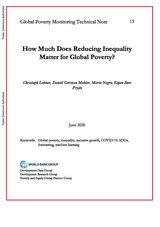Externe Publikationen

How much does reducing inequality matter for global poverty?
Lakner, Christoph / Daniel Gerszon Mahler / Mario Negre / Espen Beer PrydzExterne Publikationen (2020)
in: Global Poverty Monitoring Technical Note (13), Online
The goals of ending extreme poverty by 2030 and working towards a more equal distribution of incomes are part of the United Nations' Sustainable Development Goals. Using data from 166 countries comprising 97.5 percent of the world's population, we simulate scenarios for global poverty from 2019 to 2030 under various assumptions about growth and inequality. We use different assumptions about growth incidence curves to model changes in inequality, and rely on a machine-learning algorithm called model-based recursive partitioning to model how growth in GDP is passed through to growth as observed in household surveys. When holding within-country inequality unchanged and letting GDP per capita grow according to World Bank forecasts and historically observed growth rates, our simulations suggest that the number of extreme poor (living on less than 1.90 US Dollars/day) will remain above 600 million in 2030, resulting in a global extreme poverty rate of 7.4 percent. If the Gini index in each country decreases by 1 percent per year, the global poverty rate could reduce to around 6.3 percent in 2030, equivalent to 89 million fewer people living in extreme poverty. Reducing each country's Gini index by 1 percent per year has a larger impact on global poverty than increasing each country's annual growth 1 percentage points above forecasts. We also study the impact of COVID-19 on poverty and find that the pandemic may have driven around 60 million people into extreme poverty in 2020. If the virus increased the Gini by 2 pecent in all countries, then more than 90 million may have been driven into extreme poverty in 2020.
Kontakt
Cornelia Hornschild
Koordinatorin Publikationen
E-Mail Cornelia.Hornschild@idos-research.de
Telefon +49 (0)228 94927-135
Fax +49 (0)228 94927-130
Alexandra Fante
Bibliothekarin/Open Access-Koordinatorin
E-Mail Alexandra.Fante@idos-research.de
Telefon +49 (0)228 94927-321
Fax +49 (0)228 94927-130



